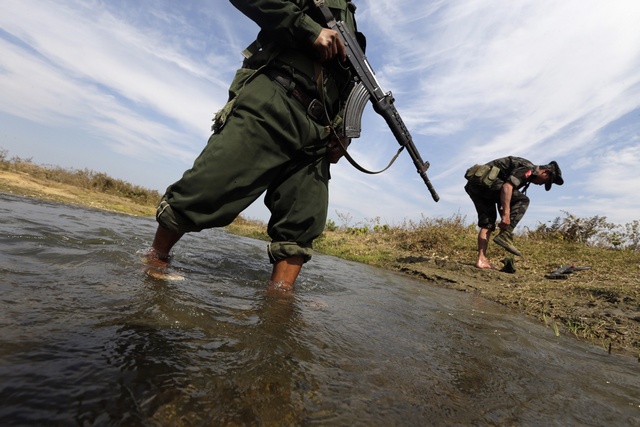Activists have blamed the latest clashes in northern Burma on a failure by both the government and Kachin rebels to follow up on their peace agreements.
Violence flared in southern Kachin state less than a week after government and rebel negotiators reached their latest peace deal in the state-capital Myitkyina.
The Rangoon-based Kachin Peace Network (KPN) insists that both the Kachin Independence Organisation (KIO) and the Burmese armed forces must honour their agreements to avoid future incidents.
In Myitkyina, the two sides agreed to lay the foundations for political dialogue, re-open roads across the conflict-torn state, establish a joint-monitoring committee and develop a plan for the voluntary return of internally displaced persons.
“As there is no implementation on the formation of the joint-monitoring committee which would allow the public to independently monitor clashes, we only get to hear both sides accusing each other of starting the fight,” said KPN’s coordinator, Khon Ja, adding that roads in the region have not been reopened yet either.
The KIO has accused the government of causing the recent violence, which claimed the life of a child and injured two others in Bhamo and reportedly forced the rebels to abandon two of their outposts in Mabein township, northern Shan state. Hundreds of refugees also fled into hiding.
“I can assure you there was no deliberate intention to engage on our part,” KIO spokesperson Dau Kha told DVB last week.
[related]
The KIO has been fighting the government for greater autonomy and ethnic rights since a 17-year ceasefire broke down in June 2011. It is the only major ethnic armed group that is yet to ink a formal ceasefire with the government.
The rebel group is set to meet with other ethnic armed groups, including representatives from the umbrella organisation, the United Nationalities Federal Council (UNFC), at its headquarters in Laiza this week to discuss the peace process.
The government hopes to secure a nationwide ceasefire by the end of next month. Ethnic representatives have insisted that President Thein Sein and the head of Burma’s armed forces, Min Aung Hlaing, must join the negotiations to ensure progress.
Hla Maung Shwe from the government-backed Myanmar Peace Centre said it may be time to consider this proposal.
“As a matter of course, state-level ceasefire agreements are signed by state border and security affairs officials [but] ethnic representatives have been calling for the president to publicly sign any agreements before international diplomats,“ he said.
“I think we should consider this if it would make them feel more assured and confident [in the ceasefire],” he said.
President Thein Sein has received international acclaim for his efforts to resolve decades of civil conflicts in the former military dictatorship, securing an end to years of crippling economic sanctions against Burma and earning a nomination for this year’s Nobel Peace Prize.
Despite several attempts to broker peace, the KIO says government forces continue to attack their positions, especially in areas near crony-owned natural resource projects. Fighting also continues to flare in Shan and Mon states.
On Friday, the UN expressed “serious concern” for the 100,000 civilians who have been ripped from their homes during the conflict.



